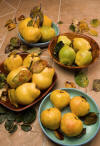WILD
FOODIES' HOME PAGE
PLANT PROFILE LIST
NAME: Quince
SPECIES / FAMILY: Cydonia Oblonga / Rosaceae
OTHER COMMON NAME(S):
CONDITIONS: full
sun - full shade
|
PARTS: |
EDIBLE |
TASTE |
RAW/COOK |
SEASON |
|
All |
|
|
|
|
|
Shoots |
|
|
|
|
|
Leaves |
||||
|
Stalk/Stem |
|
|
|
|
|
Buds |
||||
|
Flowers |
|
|
|
|
|
Fruits |
|
tart/astringent |
COOK |
Nov |
|
Pods |
|
|||
|
Seeds |
|
|
|
|
|
Nuts |
|
|
|
|
|
Roots |
|
|
|
|
|
Bark |
|
|
|
|
PORTION: small-medium
COMMENT: Fruit - raw or cooked. When grown in warm temperate or tropical climates, the fruit can become soft and juicy and is suitable for eating raw. In cooler climates such as Britain, however, it remains hard and astringent and needs to be cooked before being eaten. It is used in jellies, preserves etc. The cooked fruit adds a delicious flavour to cooked apples. Strongly aromatic with a firm but rather gritty flesh. The fruit is rich in pectin. A drink can be made by adding the dried crushed seed to water, simmering for 5 minutes and sweetening to taste.(1) Pectin levels diminish as the fruit ripens.(2)
CAUTION: The seed is poisonous. Like many of the species in the family Rosaceae it contains hydrogen cyanide (this is the substance that gives almonds their characteristic flavour). In small quantities, hydrogen cyanide has been shown to stimulate respiration and improve digestion, it is also claimed to be of benefit in the treatment of cancer. In excess, however, it can cause respiratory failure and even death.
NUTRITION/MEDICINAL: Antiinflammatory; Antivinous; Astringent; Cardiac; Carminative; Demulcent; Digestive; Diuretic; Emollient; Expectorant; Hypotensive; Laxative; Pectoral; Refrigerant; Restorative; Stimulant; Tonic.(1) Also: https://www.webmd.com/vitamins/ai/ingredientmono-384/quince
LOOK-A-LIKES:
POISONOUS LOOK-A-LIKES:
OTHER USES: Gum; Pectin; Pectin; Rootstock; Size. A mucilage obtained from the seed coat is used as a gum arabic substitute to add gloss to material. The seed contains 20% mucilage and 15% fatty oils. The fruit is rich in pectin. Pectin is said to protect the body against radiation. The leaves contain 11% tannin.(1)
SOURCE LINKS (may include nutritional and medicinal info, plus other uses):


